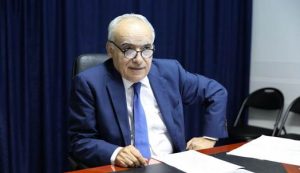By Libya Herald reporters.

Tunis, 10 September 2017:
The new UNSMIL chief Ghassan Salamé is said to be frustrated by the succession of independent attempts to broker a solution to Libya’s crises, not least because it is reliably reported that he himself intends to unveil fresh proposals in New York in the coming days.
His plan has been put together since to took up his job at the start of August. During that time Salamé has visited politicians in the east and west of the country – although a planned trip to the south had to be called off at the last minute for “technical reasons”.
He has also consulted foreign governments including Libya’s neighbours, Egypt, Tunisia and Algeria. However, he pointedly declined an invitation from Dutch foreign minister Bert Koenders to sit in on a July meeting he brokered in the Hague between delegations from the House of Representatives (HoR) and the State Council (SC). This followed a meeting Koenders had the previous week with Presidency Council (PC) head Faeiz Serraj.
The Italians, with their prime concern over migrants flows and their historical Libyan connection, have long sought a leading negotiating role among EU states. In April last year, the-then Italian foreign minister, now prime minister, Paolo Gentiloni made himself the first foreign statesman to visit Tripoli since 2014. His trip seemed a significant boost for the PC which had arrived in the capital only the previous month.
There was barely-disguised fury in Rome when French president Emmanuel Macron launched his own peace initiative persuading Serraj and Khalifa Hafter to come to Paris for talks which produced a handshake on a ceasefire, early elections and the primacy of the Libyan Political Agreement (LPA) as a basis for negotiations.
It is widely believed that Italian displeasure caused Serraj to stop off in Rome on his way home from Paris. After their meeting, Gentiloni announced that Serraj had agreed that Italian warships could operate in Libyan waters to combat people-smugglers. This was later vigorously denied by Serraj although an Italian naval fleet auxiliary vessel later arrived at Tripoli’s Busetta naval base to help repair and maintain Libyan coastguard cutters.
France has meanwhile persisted in its own peace initiative. Last week Macron sent his foreign minister Jean-Yves Le Drian to Tripoli, Misrata, Benghazi and Tobruk to chase up progress on the Serraj-Hafter Paris accord.
The French have been liaising with the Russians. Le Drian has just been in Moscow for talks with his opposite number Sergey Lavrov and last week the Kremlin hosted Beida government foreign minister Mohamed Dayri.
The Dutch, French, Italians and Russians have all protested that their initiatives are designed to reinforce the effort by the international community as represented by UNSMIL.
The details of Ghassan Salamé’s own new plan, which is widely expected to include a number of changes to the Libyan Political Agreement, will shortly be revealed to the UN Secretary General Antonio Guterres and the Security Council in New York.






